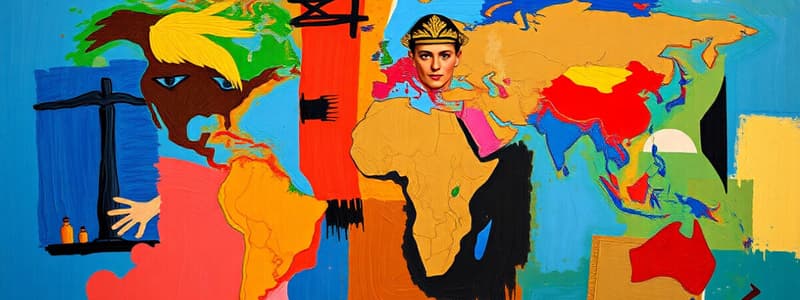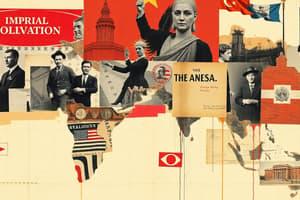Podcast
Questions and Answers
What is a primary characteristic of colonialism?
What is a primary characteristic of colonialism?
- It involves the exploitation of a territory by a foreign power (correct)
- It aims to foster independence among nations
- It encourages equal distribution of resources
- It seeks to promote local governance
How does imperialism differ from colonialism?
How does imperialism differ from colonialism?
- Imperialism restricts trade between nations
- Imperialism usually involves direct control over territories
- Imperialism provides immediate independence to colonies
- Imperialism often relies on economic influence rather than military force (correct)
Which of the following is an impact of colonialism in Southeast Asia?
Which of the following is an impact of colonialism in Southeast Asia?
- Strengthening of local traditions and cultures
- Introduction of foreign languages and cultures (correct)
- Complete political autonomy for local governments
- Increased economic self-sufficiency among indigenous populations
What role did economic exploitation play in the context of imperialism?
What role did economic exploitation play in the context of imperialism?
What was a common justification for colonialism by imperial powers?
What was a common justification for colonialism by imperial powers?
What motivated many imperial powers to expand their territories in Southeast Asia?
What motivated many imperial powers to expand their territories in Southeast Asia?
Which effect did colonialism have on the social structures in Southeast Asia?
Which effect did colonialism have on the social structures in Southeast Asia?
What was a significant economic outcome of imperialism for Southeast Asia?
What was a significant economic outcome of imperialism for Southeast Asia?
How did imperialism influence the cultural landscape in Southeast Asia?
How did imperialism influence the cultural landscape in Southeast Asia?
What role did education play during the colonial period in Southeast Asia?
What role did education play during the colonial period in Southeast Asia?
Flashcards
Colonialism
Colonialism
The practice of one country taking control of another country's land, resources, and people.
Imperialism
Imperialism
The policy of expanding a country's power through conquering and controlling other territories.
Decolonization
Decolonization
The process by which a country becomes independent from a colonial power.
Region
Region
Signup and view all the flashcards
Southeast Asia
Southeast Asia
Signup and view all the flashcards
Study Notes
Colonialism and Imperialism
- Colonialism is the direct control and occupation of one country by another, aiming to claim and exploit resources. The controlled territory is called a colony.
- Imperialism is the expansion of a country's influence to control other countries' economies, politics, and cultures. Colonialism is a method of imperialism.
- Colonial control methods include military force, bringing citizens to live permanently in the colony, and establishing similar governmental systems, education, religion and laws to those in the controlling country.
- Imperialism can be direct, like establishing a colony, or indirect, like concessions, protectorates, or spheres of influence.
- A concession gives foreigners control over trade and resources in a specific area.
- A protectorate involves a powerful country protecting a smaller one but maintaining control. France's protectorate over Cambodia is mentioned as an example (1863).
- A sphere of influence is a region where a powerful country has predominant influence over political, economic and social activities.
- Imperialists exploit natural resources and labor.
- Imperialists use force, intimidation and deception to achieve compliance.
- Colonization and Imperialism often result in resistance and resistance from the natives/colonized people/land.
- Colonialism is understood as the conquest of one country by another and is directly related to imperialism, but not synonymous with it. Knowing the differences between terms is key to understanding the strategies.
Direct and Indirect Occupation
- Direct occupation involves a centralized government where foreign powers hold all important positions, often forcing assimilation of local cultures and traditions.
- Indirect occupation involves allowing local leaders to stay in place, but with significant foreign control over governance (taxation, foreign relations, trade, communications). Portuguese control of Malacca starting 1511 is an example of direct colonial control.
Summary
- Colonialism and Imperialism are key concepts in understanding the history of Southeast Asia and the Philippines.
- Imperialism is the expansion of power, control or influence.
- Colonialism is one way of achieving imperialism (direct control).
- Colonization goals include the control of land, direct control of people, control of resources and the benefitting from cheap labor/services.
- Indirect approaches like protectorates, concessions and sphere of influence is a more subtle/less direct form of controlling/exploiting other regions.
- In indirect control, imperialist countries (foreigners) may control important governmental areas like taxes and regulations but natives are allowed to maintain some positions.
Formative Assessment
- Colonialism: the direct and complete control of a territory by a more powerful nation-state.
- Imperialism: the expansion of a country's power and influence over other countries.
- Methods of Imperialist control: direct colonialism; protectorates; concessions; spheres of influence
- Three methods of establishing direct colonial control: military force, moving citizens, implementing similar government/social systems in the colony
- "kolonus" means farmer (Latin origin of the word "colony").
- Concession: a territory granted to foreign entities for limited control over particular issues.
- Colonial/imperialist powers often have interests in exploiting resources, labor, and territory.
Studying That Suits You
Use AI to generate personalized quizzes and flashcards to suit your learning preferences.




